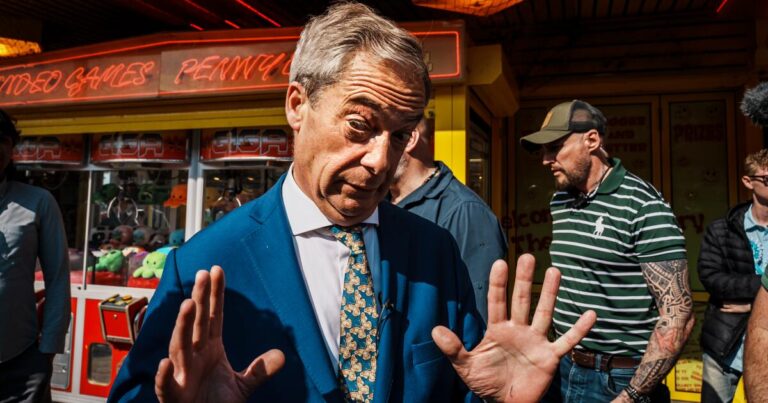In a sludgy, slow-motion trajectory, the pale yellow milkshake reached its target on the first day of Nigel Farage’s insurgent campaign to win a seat in the British Parliament.
But voter discontent in the air couldn’t stop the country’s most cheerfully polarizing public figure from shaking up what had previously been seen as a relatively calm battle between Britain’s two biggest parties. With the ruling Conservative Party already expected to suffer a decisive defeat at the hands of the left-wing Labour Party, Mr Farage came forward in a surprise announcement in early June.
Some observers believe the return of Mr Farage, 60, a political flame-thrower, architect of Brexit and leader of a small but hardline anti-immigration party, could mark a MAGA-like takeover of the Conservative Party, which has played a prominent role in British politics for nearly 200 years.
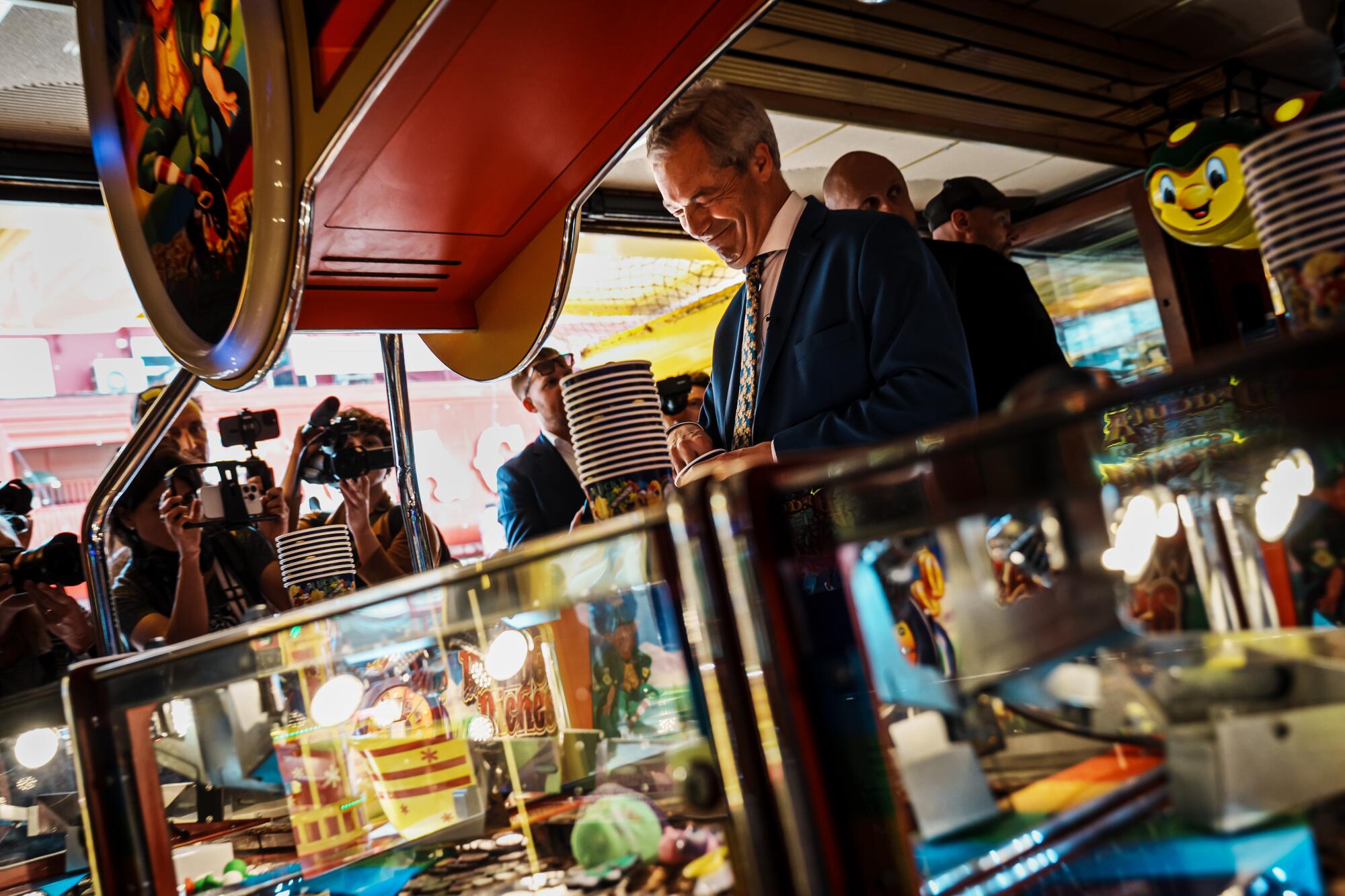
Nigel Farage, leader of the anti-immigration reformist UK party, plays games in an arcade below the party’s offices in Clacton-on-Sea, England.
And his high-profile presence will once again introduce a relentlessly vocal voice into the recent nationalist-populist surge in Western Europe and elsewhere, whose full significance may soon become clear.
“He’s good at attracting attention and he sees himself as a disruptor who wants to overthrow the existing order,” said Mark Wickham-Jones, a politics professor at the University of Bristol. “His policies are not very consistent, but that doesn’t really matter in terms of his support.”
Opinion polls suggest Mr Farage’s party, Reform UK, is unlikely to come close to winning Thursday’s general election, but after seven straight losses, Mr Farage finally seems poised to win an election to the House of Commons, the 223-year-old lower house of parliament.
Mr Farage, who hails from a leafy village on the outskirts of London, is running for his eighth parliamentary seat in Clacton-on-Sea, a rundown seaside town with a warped, labyrinthine atmosphere of bustling arcades, shuttered shopfronts and grubby, darting seagulls. (In Britain, parliamentary candidates do not have to live in their constituencies.)
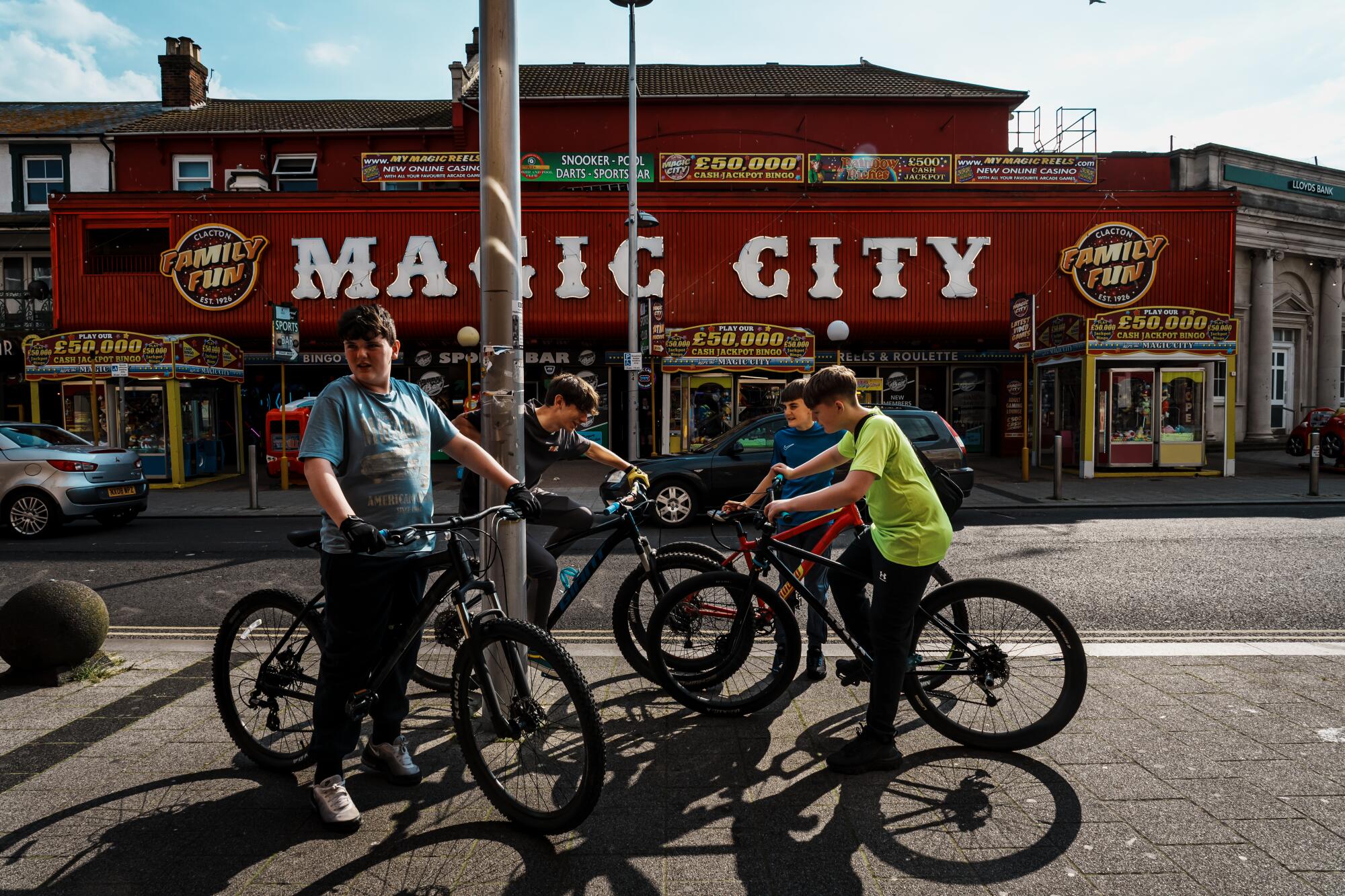
Boys on bikes hang out near the main street in Clacton-on-Sea, a town and surrounding villages plagued by high unemployment and poverty.
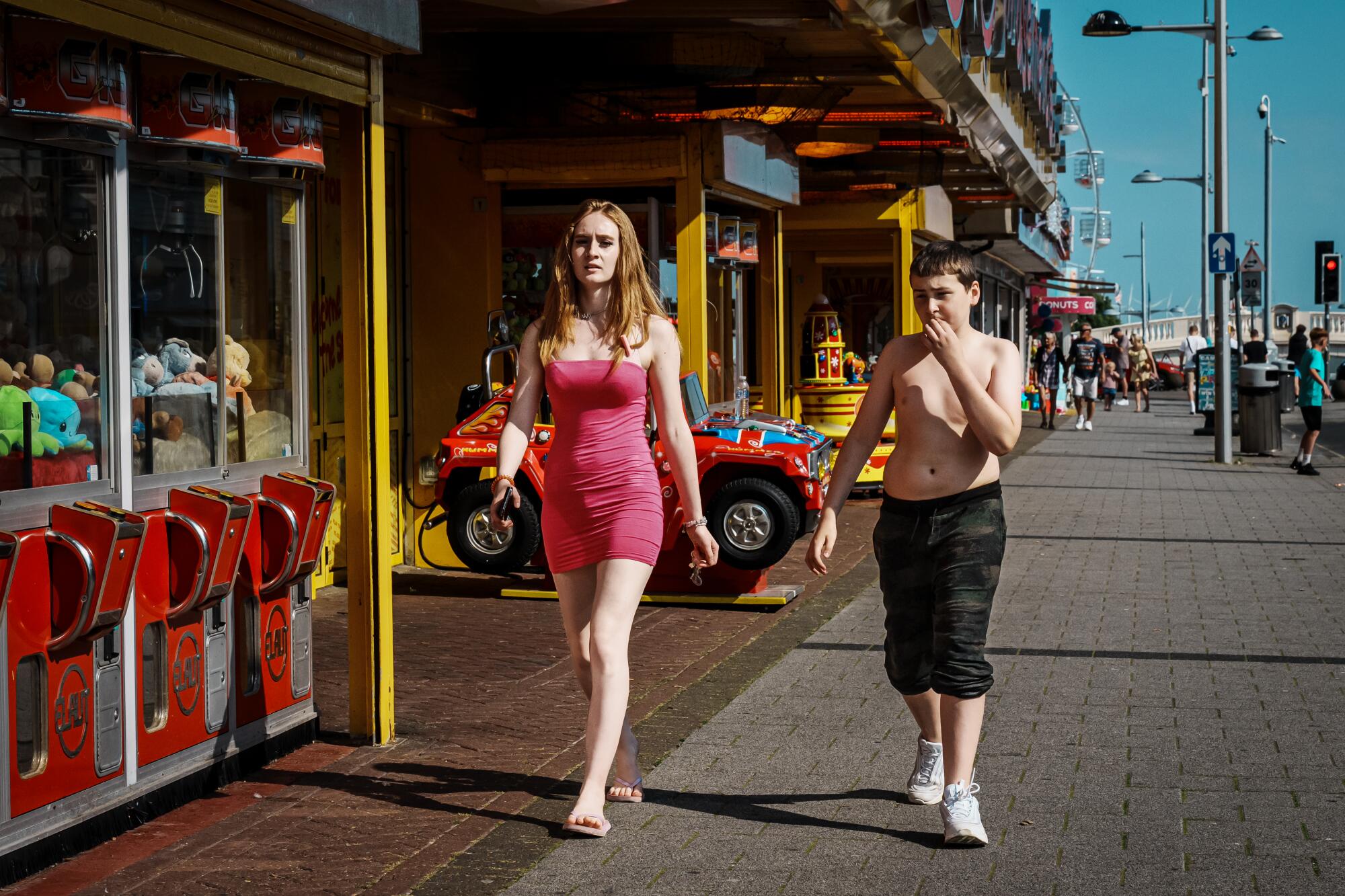
People walk through one of the many arcades near the beach in Clacton-on-Sea.
“There’s something happening over there – momentum!” Mr Farage told a group of sweaty, enthusiastic supporters recently in his tiny local headquarters, above one of the glitzy arcades that line the seafront boulevard.
“It’s like a million conversations going on at the breakfast table, in the bingo hall, in the pub: ‘Oh my goodness, we were just talking about you!'” he said, almost ecstatically.
In many ways Clacton is a suitable election venue for Mr Farage.
Although there are some affluent areas in the town and surrounding villages, overall there are high rates of unemployment and poverty. In the 2016 referendum, 70% of the constituency voted to leave the EU. Two years earlier, the Reform Party’s predecessor, the UK Independence Party (UKIP), had won its first parliamentary election in Clacton’s constituency.
In a political pattern common in the United States and continental Europe, voters in Clacton, where immigration is relatively low, tend to be much more vocal than the general population in calling for significant cuts in immigration.
Farage “has been successful in playing on people’s fears, their anxieties about identity and the sense that society is changing rapidly,” said Wickham-Jones, who said other politicians have struggled to articulate a counter-argument about the social benefits of immigration and ways to limit it in less dramatic ways.
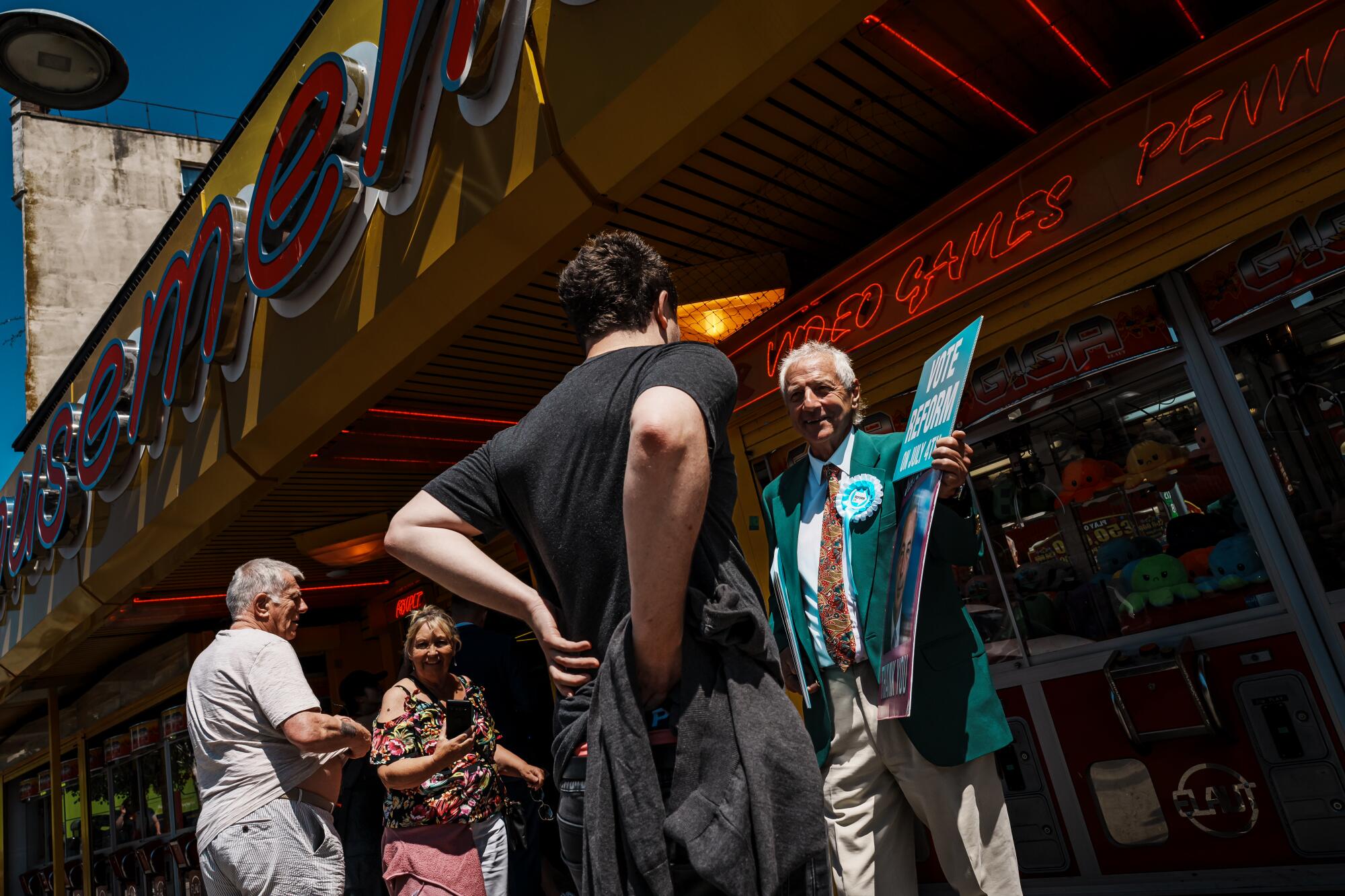
David Allam (right) campaigns for British politician Nigel Farage outside the Reform Party offices above the Arcade Centre in Clacton-on-Sea.
The Labour candidate in Clacton is a charismatic 27-year-old man of Jamaican and Ghanaian descent named Joban Owusu Nepaul, born in Nottingham, England, who is seen as unlikely to overtake Farage, but some political observers say his quick-witted, social media-heavy campaigning style makes him someone who could one day be on the national stage.
In a side street in Clacton, Pushkar Dasmara, a 40-year-old who migrating from India, said he supports Owusu Nepaul but knows most of his neighbours do not.
“The care industry relies on immigration,” said Dasmala, who works in a private care home and said Farage’s opponent “understands the situation” faced by new arrivals trying to settle in the UK.
Labour’s projected lead in the parliamentary vote bucks a recent trend of nationalist populist victories elsewhere in Europe. Labour has been buoyed by a wave of public discontent with the Conservatives, who have been in power for almost 15 years, through the pandemic and Britain’s messy departure from the European Union, which was formalized in 2020.
For years, the Conservative government has imposed harsh austerity measures that eviscerated Britain’s public sector, including the much-respected but deeply troubled National Health Service. The Conservative government has repeatedly replaced the prime minister in the fight over Brexit, culminating in the scandal-plagued government of Boris Johnson, who is due to step down in ignominy in 2022.
Johnson’s successors haven’t fared much better, starting with the hapless Liz Truss, who became the shortest-serving prime minister in modern British history and spawned a meme about whether her 50 days in office could outlast a wilted head of lettuce, and then there’s current chancellor Rishi Sunak, who is calling for another vote when it becomes clear that the Conservative Party’s plummeting support could fall further.
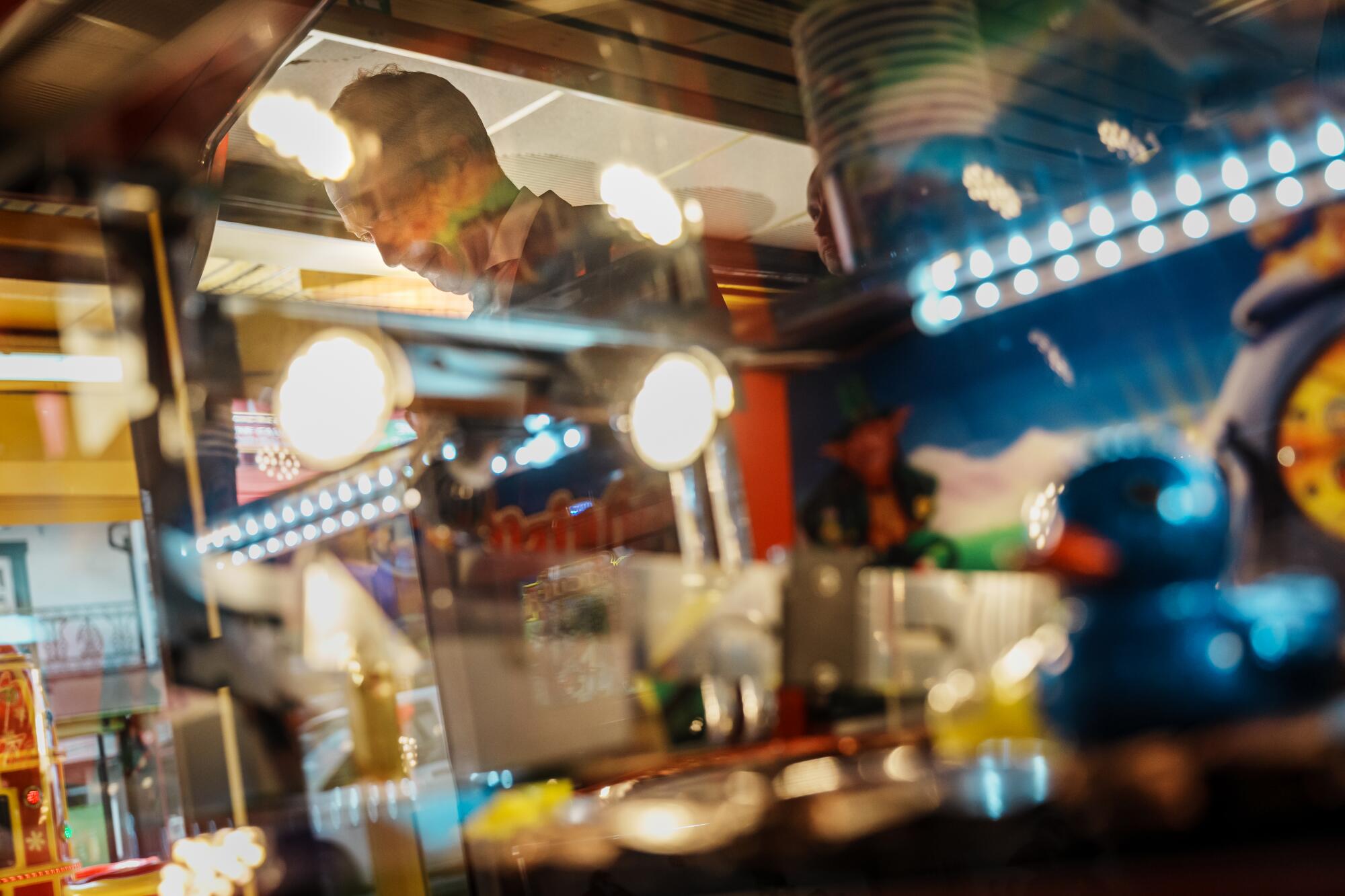
Nigel Farage plays an arcade game. The anti-immigration politician from a leafy village outside London is standing for his eighth parliamentary seat in the rundown seaside town of Clacton-on-Sea.
Farage’s re-emergence, in which he entered the parliamentary election after initially saying he would not stand, comes at a tough time for mainstream political leaders in Western Europe.
In France, President Emmanuel Macron is trying to stave off the rise of the far right in two parliamentary elections running through July 7. Meanwhile in Germany, a far-right party came second in European Parliament elections this month, exposing his centrist government to scathing criticism.
There is sometimes a certain synchronicity between American and British politics: Brexit was narrowly approved just months before Trump won the 2016 presidential election, and prominent Trump supporters have noted with glee the rise of the far-right in countries like France, Germany and Italy.
Before, during and after the former US president’s inauguration, Farage tried hard to insert himself into Trump’s sphere of influence, even if only as a distant satellite.
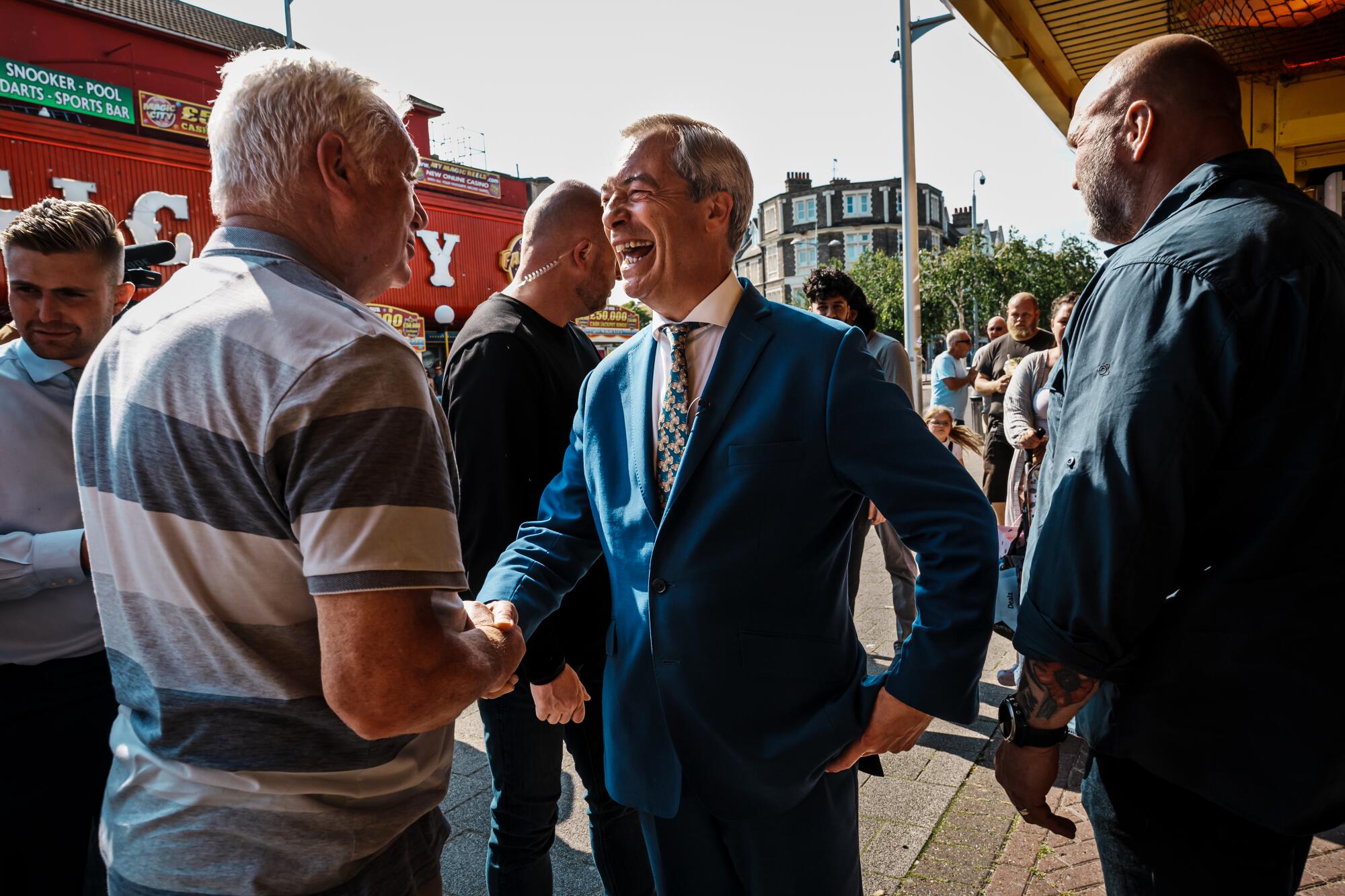
Nigel Farage’s slogan echoes Donald Trump’s “Make Britain Great Again”
In a recent interview with Britain’s ITV, Farage asserted that Trump would have “learned a lot” from his inflammatory and insulting speech in the European Parliament, where he once sat, but generously added that the instruction went both ways.
Farage’s slogans are similar to Trump’s “Make Britain Great Again”, he describes the country as in terminal decline and enjoys calling his opponents “boring idiots”.
Mr Trump, meanwhile, is an avowed supporter of Brexit and his campaign hinges on many of the same social divisions that animated Mr Farage’s – immigration, economic discontent and the culture wars.
Some political commentators, and Farage himself, have suggested the vote could put him in a position to take control of a effectively hollowed-out Conservative Party, in what some see as a parallel to events across the Atlantic, where Trump’s MAGA movement has seized the Republican establishment.
“There may be a reformist attempt to take over the Conservative party after the election, perhaps drawing Farage in if he is elected MP,” said Andrew Brick, professor of politics and contemporary history at King’s College London.
“I don’t know if this will be successful, but if it is, it will make the Conservative party look like the Republican Party in the age of Trump,” he said, which would leave a victorious Labour Party and its prime ministerial candidate, Keir Starmer, facing a much more radical and hardline opposition.
Despite the large fan base he has enjoyed during the election campaign, Farage has faced strong opposition across the political spectrum, having been slammed for comments he has made about NATO causing Russia’s war in Ukraine, as well as for making blatant misogynistic remarks and voicing what critics have described as thin-skinned racist sentiments.
“You don’t need to watch a sheepdog race to hear a dog whistle,” former Conservative prime minister David Cameron told The Times of London about Farage.
On the day that Farage launched his campaign in Clacton, a young female bystander, who was later arrested, poured a milkshake over him on the steps of the famous seaside pub, The Moon and Starfish. It was not the first milkshake of Farage’s career, but he handled the incident with some composure, smiling for the cameras later that day with a banana shake in hand.
But three weeks later, the man known for his combative politics was clearly still harboring a grudge.
“Politics has changed,” he said. “People have changed. Throw Tell you things.”
His controversial personality was evidenced by a Clacton couple who were dining the other afternoon on the terrace of the pub where the milkshake incident occurred.
Paula Bracegirdle, a part-time chef hoping to retire soon, worries that Farage “is a bit extreme”, but her husband Paul, 60, who works part-time with an elderly person with dementia, calls him a “truth teller”.
“I think he’s being honest,” he said.
They also disagreed on Brexit: she voted to remain in the EU in 2016. He supported the Leave campaign spearheaded by Mr Farage and, like him, blamed the Conservative party for failing to manage Brexit effectively.
But they agreed on one thing: Clacton, they both said, was no better off than it had been.

